By Ionica Pascanu
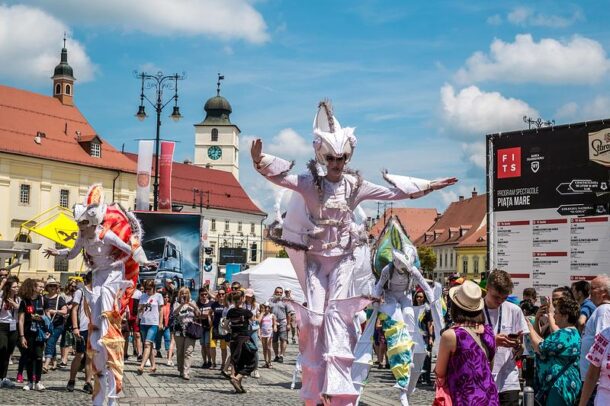
Sibiu Theater Festival opening. Photo: Simona Fodor.
In the early 1990s, Constantin Chiriac, the President of the Sibiu International Theatre Festival, had a dream: to develop the cultural background of the city, in general, and theatre and performing arts in particular, and furthermore to make art a way of living. He has succeeded in making this dream come true. Perhaps the urban environment of the town of Sibiu, resembling a theatre scene, helped a lot. Today, 29 years later, his dream has changed the city in so many ways, including socio-economical and cultural points of view, that Sibiu is no longer just another Romanian town. Out of the ten days of unforgettable cultural feast every year we save in our minds and souls the art of giving joy, beauty and hope, as if we ourselves become characters in a dream – exactly as professor and theatre scholar Octavian Saiu emphasized in the opening of Celebrities’ Gala in Sibiu this year.
Here are just a few titles from the 2022 European program of the Festival: Amore, Pippo Delbono Company; Mr. Ibrahim and the Flowers of Koran, Eric-Emmanuel Schmitt & Theatre Rive Gauche; 3STRS, TR Warszawa & National Stary Theatre Krakow, Contre-Enquetes; Theatre Vidy-Lausanne; Exit the King, Theatre in der Josefstadt GmbH; Heart and other flesh matters, Marin Sorescu National Theatre, Craiova; Macbeth, The Scarlet Princess, Three Sisters, Faust, Radu Stanca National Theatre, Sibiu; Betrayal, National Theatre of Târgu Mureş; Sunday, Focus and Chaliwate Company; Clara Haskil. Prelude and Fugue, Franţa; Kreatur, Sasha Waltz & Guests; Triomix, Gigi Căciuleanu & Fundaţia Art Production, JTI; The Tower #nextlevel, Basca Theatre; Macbettu, Sardegna Teatro and Compagnia Teatropersona. Non-European stage arts were also celebrated: Black and White Tearoom-Counsellor, Theatre Hooam & AtoBIZ Ltd., Korea; The Voices of Noh, Yamamoto Noh Theatre; Pardes, Vertigo Dance Company; Asylum, Kibbutz Contemporary Dance Company; The Butterfly Lovers, Baiyue Culture Creative; King Lear, Matsumoto Performing Arts Center etc.
Embarking on a Theatrical Journey: Only a Few Words about Only a Few Performances
It is difficult to capture in words the spirit of an artistic performance and any attempt is like a translation that cannot stay faithful to the original all the way through because the translator would inevitably insert their vision, even by the mere choice of words. It is the same with the theatre critics whose duty is to educate themselves into the “art of being a spectator,” if I may use the title of Octavian Saiu’s newest book, launched at FITS 2022. To be a good spectator means to manifest empathy, playfulness, consideration for the creative context of the performance, and the capacity to feel the stage. If I were to describe the FITS 2022 from this perspective, I would say it had the colours and the diversity of a rainbow.
3STRS, directed by Luk Perceval, is a show which changed the dramatic text’s atmosphere. The melancholy and hope that something good will prevail in the end – sentiments that are always there in Chekhov’s dramas – have disappeared in Perceval’s rendering of the play, as the characters have to bluntly face their human limitations. The actors recurrently appear in front of a huge mirror emphasizing the idea that we are simply viewers of our destiny, like in a movie projection.
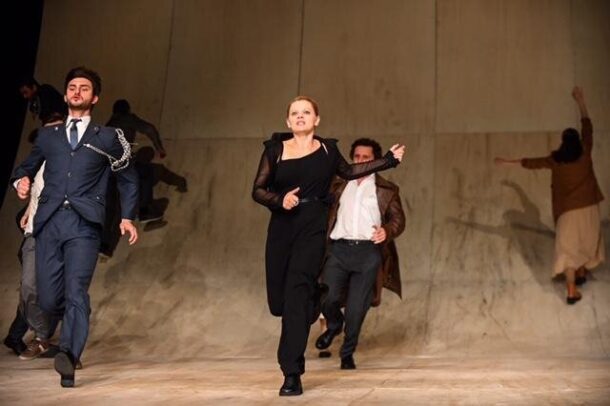
Three Sisters, produced by Radu Stanca National Theatre and directed by Andrei and Andreea Grosu. Photo: Scena TNRS.
One of the great opportunities offered by the festival is to compare different directorial visions of one and the same plays. Such was the case with Chekov’s Three Sisters. A Romanian Three Sisters, produced by Radu Stanca National Theatre and directed by Andrei and Andreea Grosu, explored other dimensions of the play: the characters’ impossibility to be free and escape from the hardships of their lives was reflected by a slope that made the horizon disappear altogether. Also, the actors remained standing up almost throughout the entire performance, showing their anxiety and eagerness to run away.
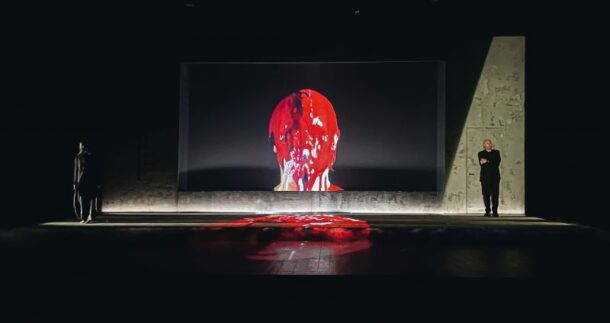
Macbeth, by Radu Stanca National Theatre. Photo: Sebastian Marcovici.
Similar comparisons were possible with regard to Macbeth. There were three versions of it: one staged by Botond Nagy at the Radu Stanca National Theatre, another directed by Alessandro Serra at the Sardenga Teatro & Campagnia Teatropersona, and yet another one directed by Boris Vasileski at the University of Drama Art from Skopje. Nagy’s version explored the text from a visual point of view, through symbolical images and the link between sub-consciousness and power, whilst Serra’s was first and foremost an impressive acoustic performance – a combination of powerful theatrical sounds: the cruelty of Shakespeare’s characters was made apparent through the quick changes of vocal tonalities. The invisible line between real and unreal, between power and vulnerability, and between life and death, specific to this masterpiece was revealed in all three productions.
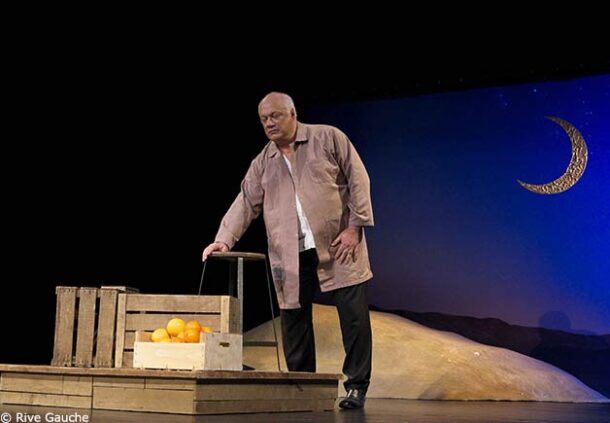
Eric-Emmanuel Schmitt in Mr. Ibrahim and the Flowers of Koran. photo: Theatreonline.
Eric-Emmanuel Schmitt performed his own text. Mr. Ibrahim and the Flowers of Koran, under the direction of Anne Bourgeois, and he touched the viewers’ souls in an unforgettable way. He captured the complex shades of humanity, the delicacy, tenderness, and humor that are all present in his text. The plot is that of a bildungsroman, a very common literary pattern, but his vision was charmingly original. Schmitt’s charm was at display also in the great dialogue he had with Octavian Saiu. The audience was pleased to discover intimate details about his artistic craft, to find out more about his work as a playwright or as an actor, and to simply enjoy the great exchange of thoughts and ideas between the two of them.

Clara Haskil, Prelude and Fugue, directed by Safy Nebbou and performed by Laetitia Casta. Photo: Fabienne Rappeneau.
Another special dialogue was between Saiu and Laetitia Casta, the famous model and actress from France. The State Philharmonic Sibiu hosted this dialogue, as well as the show itself: Clara Haskil, Prelude and Fugue show, directed by Safy Nebbou, and performed by Laetitia Casta. The extraordinary one-woman show revealed the two sides of the same fragile, delicate artist: at once very shy and fully powerful. Casta told us the story of a genius pianist, a woman of Romanian origins who became a great virtuoso of the piano concert world.
Black and White Tearoom – Counsellor, Hyun Suk Cha’s show, was a demonstration of a different kind of virtuosity. Two Korean actors reached our souls and minds through a nuanced and credible performance that affirmed essential moral values as the true pillars of life. The Chinese play The Butterfly Lovers, directed by Guo Xiaonan, Baiyue Culture Creative, was also an invitation to explore the Asian stylistic universe, even if the story of impossible love had Shakespearean echoes. Every move, gesture, and look of the two androgynous-looking characters was extremely impressive through their mixture of artistry and passion.
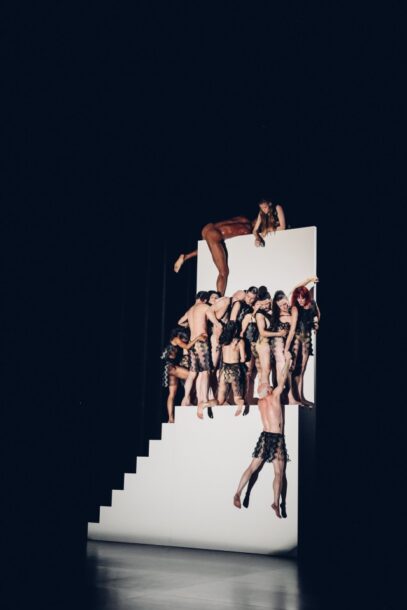
Kreatur, by Sasha Walt. Photo: Claudio.
Commonly a typical festival spectator looks for whatever they believe would meet their inner expectations. There are so many cases, though, when an unexpected bright spark of joy appears out of nowhere. Hora-The Movie (Batsheva Dance Company, choreographer: Ohad Naharin), Asylum (Kibbutz Contemporary Dance Company, choreographer: Rami Be’er), Kreatur (Sasha Waltz & Guests, choreographer: Sasha Waltz), or The Jump (Jesus Carmona Dance Company, director: Jesus Carmona) are just few examples of such unexpected joy for the theatre-inclined festival spectator. Dance reaches the same goal as the theatre in Sibiu: it shows us how to embrace and celebrate our own bodies and spirits.
A Mere Picture Frame Trying to Capture Many Other Artistical Manifestations of the Festival
Indoor performances, dance, music, and theatre are part of one large category, probably the most significant one in the entire festival. However, there are many other outdoor attractions: music concerts, living statues, acrobatics, street theatre and so on – all of them being moments of real happiness in a very accessible cultural feast. One of the most interesting projects in this category was The Legacy Project, directed by Mihai Mălaimare with students from almost all theatre higher education programs in Romania: Lucian Blaga University of Sibiu, George Enescu University of Iaşi, West University of Timişoara, Ovidius University of Constanţa. The students had a hard task to accomplish: to keep, even if for only a few minutes, the passers-by from rushing to daily jobs and transform them into a real theatrical audience. Despite the torrid heat, the theatre students did exactly that, revealing real acting skills.
Alongside all these theatrical events, there is another part of the FITS, usually considered a rather elitist area, reserved exclusively for professionals, but one that is attracting more and more spectators every year. It consists of talks and conference sessions. The International Platform for Doctoral Research in the Fields of Performing Arts and Cultural Management, whose theme is chosen every year by its Chair, Octavian Saiu, was in 2022 dedicated to The Beauty of Theatre. The Theatre of Beauty. Art Against War. There were also numerous book launches, installations, exhibitions, speed networking (a very useful platform for all the producers of arts performances, who had so much to suffer because of the pandemic), the Walk of Fame (six more stars were added in 2022: Sasha Waltz, Krzysztof Warlikowski, Gotz Teutsch, Eric-Emmanuel Schmitt, Claus Peymann and Ion Caramitru), play readings, VR theatre, workshops, etc.
I shall emphasize again a simple truth: to be part of any section of the festival is an acknowledgement that one’s work matters at an international level.
“We Have a Dream”: International Association of Theatre Leaders (IATL) Is Born
A significant moment for all theatre leaders (managers, curators, artists, scholars) present at the festival was the launch of an ambitious and visionary project, with a promising future ahead. The name of this project is the International Association of Theatre Leaders (IATL), and – as its beautiful website, https://theatreleaders.org, clearly reveals – it aims to establish a unique platform of global connectivity for theatre leaders. One of its main goals is to enable young leaders from various cultural spaces to face the ongoing socio-economic challenges of our times and to build up a strong community based on cooperation and communication.
The President and Founder of IATL is professor Octavian Saiu. The Advisory Board consists of theatre personalities acclaimed all over the world: Constantin Chiriac – president of the Sibiu International Theatre Festival, Yvette Hardie – Honorary President of ASSITEJ, Sir Jonathan Mills – Director of the Edinburgh International Culture Summit, Stan Lai – Playwright, director, Founder of the Wuzhen Theatre Festival; Jean-Guy Lecat – Scenographer, Theatre architecture consultant, Michael Dobson – Director of the Shakespeare Institute; Christine Schmalor – Programme Director World Theatre Training Institute/ ITI, Stanley Gontarsky – Robert O. Lawton Distinguished Professor, Ricardo Abad – Professor Emeritus, Ateneo de Manila University, Tobias Biancone – Director General of ITI.
The members of the Executive Board are also extremely significant figures in the theatre field: Jaroslaw Fret – Founder of Teatr ZAR, Director of the Grotowski Institute, Bernice Chan – Examiner for the Hing Kong Arts Development Council, Vladislava Fekete – Director of the Theatre Institute in Bratislava, Taiwo Afolabi – Director of the Centre for Socially Engaged Theatre; Narine Sargsyan – Vice-Rector, Yerevan State Institute of Theatre and Cinema, Pawit Mahasarinand – independent scholar, art critic and producer, Magda Romanska – Executive Director of the Theatre Times, Principal at metaLAB.
The inaugural IATL fellowship was awarded to Sasha Waltz – German choreographer, dancer, and leader of the dance company Sasha Waltz & Guests. Announced on the last day of the festival, this was a most suitable event for ending a really special edition of FITS, one that opens up new possibilities for cultural encounters and dialogue.
Ionica (Paşcanu) Alexiu (born in 1974) is a Romanian language and literature teacher and holds two bachelor’s degrees, in philology (“Dunarea de Jos” University of Galaţi, graduated in 1997) and in theatrology (National University for theatre and film “I.L. Caragiale”; graduated in 2009) and a master degree, also in theatrology, from 2011. Currently, Ionica is working on her Ph. D. at the ‘’Lucian Blaga” University of Sibiu.

European Stages, vol. 17, no. 1 (Fall 2022)
Editorial Board:
Marvin Carlson, Senior Editor, Founder
Krystyna Illakowicz, Co-Editor
Dominika Laster, Co-Editor
Kalina Stefanova, Co-Editor
Editorial Staff:
Asya Gorovits, Assistant Managing Editor
Zhixuan Zhu, Assistant Managing Editor
Advisory Board:
Joshua Abrams
Christopher Balme
Maria Delgado
Allen Kuharsky
Bryce Lease
Jennifer Parker-Starbuck
Magda Romańska
Laurence Senelick
Daniele Vianello
Phyllis Zatlin
Table of Contents:
- AVIGNON 76. A Festival of New Works by Philippa Wehle
- Almodóvar’s Women on the Verge in Portugal by Duncan Wheeler
- BRACK IMPERie. About “Hedda Gabler” by Vinge/Müller at Norske Teatret Oslo by Thomas Oberender
- Embodied Intimacy: The Immersive Performance of The Smile Off Your Face at Edinburgh by Julia Storch
- Fear, Love, and Despair – Radu Afrim: Director of Core Feelings by Alina Epîngeac
- Grec Festival de Barcelona, July 22 by Anton Pujol
- I Think of Curatorial Work in Scholarly Terms: An Interview with Ivan Medenica by Ognjen Obradović
- New Worlds Revealed in an Immigrant Journey, and an Unexpectedly Meaningful Universe Discovered and Destroyed Inside Styrofoam, at the Edinburgh Festival by Mark Dean
- Participation, Documentary and Adaptation: Barcelona Theatre May 2022 by Maria Delgado
- Report from Berlin, April 2022 by Marvin Carlson
- Report from Berlin (and Hamburg….) 5/2022 by Philip Wiles
- The Sibiu International Theatre Festival Transforms Dreams into Reality (The Magic of 2022 FITS in Short Superlative) by Ionica Pascanu
- Theatre in Denmark and The Faroe Islands – Spring 2022 by Steve Earnest
- The Polish Nation in a Never-Landing Aircraft by Katarzyna Biela
- The Piatra-Neamt Theatre Festival in Romania: 146 Kilometers from Heart to Heart by Cristina Modreanu
- Will’s Way at the Shakespeare International Festival Craiova 2022 by Alina Epîngeac
- Interview with the Turkish theatre critic Handan Salta on TheatreIST by Verity Healey
www.EuropeanStages.org
europeanstages@gc.cuny.edu
Martin E. Segal Theatre Center:
Frank Hentschker, Executive Director
Marvin Carlson, Director of Publications
©2022 by Martin E. Segal Theatre Center
The Graduate Center CUNY Graduate Center
365 Fifth Avenue
New York NY 10016
European Stages is a publication of the Martin E. Segal Theatre Center ©2022



